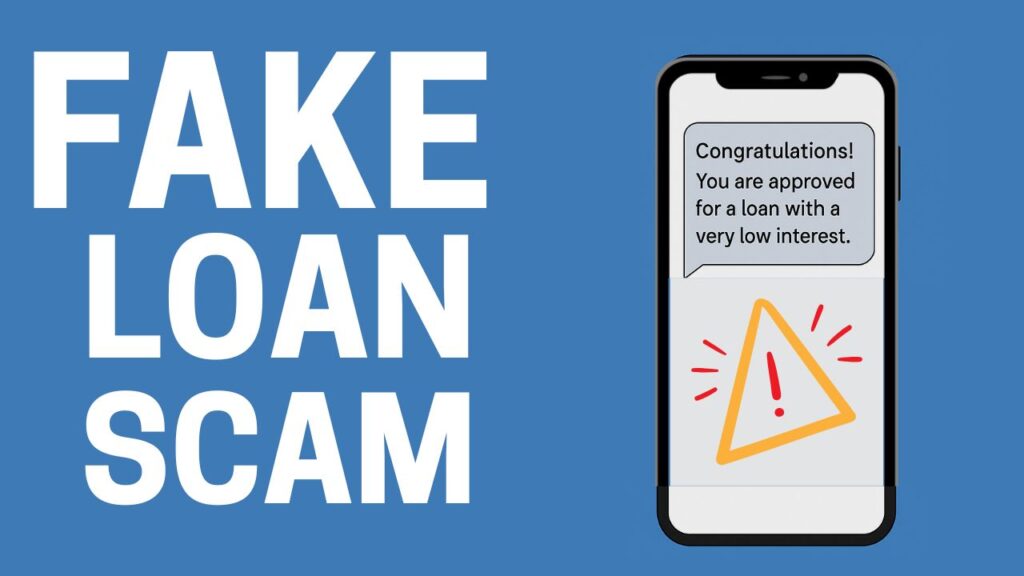Sarah, a simple woman from Manchester and the mother of two kids, received a text message, “Congratulations, you are approved for a loan with a very low interest.”. Looking at the upcoming expenses, like unpaid bills and the Christmas party. She felt happy and decided to take the opportunity.
She clicked the link, filled in her details, and within a few minutes, someone claiming to be from a legit lender called her. They said she was approved, but there was a small processing fee to pay before the funds could be released.
Desperate and hopeful, Sarah paid the fee. Then another fee. Then another. By the end of the week, she’d sent nearly £1,200. The loan never came. The number was disconnected. The website vanished. And Sarah realised she had fallen into a fake loan scam.
What Is a Fake Loan Scam?
A fake loan scam is when criminals trick people by showing themselves as they are offering real loans, and they usually target people who are in a hurry or really need money. These scammers are very clever and make their websites, emails, and messages look like they are from trusted UK companies, sometimes even using real company names to make you believe them. After you start trusting them and think everything is going well, they suddenly ask you to pay some money first, this could be for an advance fee, insurance, or something they call a processing charge, saying it’s needed before they can send you the loan, but once you pay, the loan never comes and they disappear.
How Do They Trick You?
- Cold Calls and Texts: You might get a call, email, or message out of the blue offering you a guaranteed loan.
- Fake Websites: These sites often copy real loan providers. They have proper terms and logos, but are completely fraudulent.
- Urgency: They might pressure you to act quickly, saying the offer ends soon or your credit score is at risk.
- Fees First: Before you see any money, they ask for a “small” fee for processing, insurance, or admin.
Why Do People Fall for It?
Most victims, like Sarah, are already under financial stress. Scammers use emotional tricks and false promises to scam people, when they can’t even expect it. Their confidence and use of real UK company numbers make it hard to tell the difference between genuine and fake loan offers.
The Growing Problem in the UK
According to Action Fraud UK, thousands of people have reported being victims of fake loan scams in the past year, with losses reaching millions. The problem worsens during economic uncertainty when more people seek financial help.
Fraudsters target:
- People with poor credit scores
- Young adults in need of quick cash
- The elderly who may not be internet savvy
- People with urgent family or medical needs
How to Stay Safe from Fake Loan Scams
- Never Pay Upfront: Legit lenders don’t ask for advance fees before giving you a loan.
- Check FCA Register: Use the Financial Conduct Authority’s site to verify if the lender is authorised.
- Be aware of Pressure Tactics: Real companies never put pressure on or threaten you
- Look for Red Flags:
- odd email addresses (e.g., loan1234@gmail.com)
- No landline phone numbers
- Poor spelling and grammar
- odd email addresses (e.g., loan1234@gmail.com)
- Ask a Trusted Friend: If unsure, show the offer to someone you trust before sending any money.
What to Do If You’ve Been Scammed
- Stop Contact: Don’t talk to the scammers anymore.
- Report to Action Fraud: Go to www.actionfraud.police.uk or call 0300 123 2040.
- Tell Your Bank: Let your bank know immediately. They might be able to recover your money.
- Change Your Details: If you gave them personal info, then think about changing passwords or even bank accounts.
Summing up
Fake loan scams are cruel and target people when they are most vulnerable. While Sarah is still trying to recover financially and emotionally, she hopes her story warns others.
If something looks too good to be true, then it is usually not real. Always stay careful, keep learning about scams, and don’t let scammers trick you. If you or someone you know has been scammed by a fake loan scam, then make sure to tell the police and ask for help.
When we talk about these scams and learn how they work, we can help ourselves and others stay safe from the people who do fake loan scams.
FAQ(Frequently asked question)
Qstn: Can police recover money from a scammer?Ans: It depends. If the scam is reported quickly and the funds haven’t been withdrawn by the fraudster, there’s a small chance your bank or authorities can stop the transaction. In most cases, especially with international scams or if payments were made via wire transfer or crypto, recovery is difficult. However, reporting the scam helps the police investigate and potentially shut down fraud rings, which can protect future victims.
Read more :- How to Spot a Fake Text Message in Seconds

